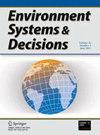在资产管理框架中集中于以人为中心的行业、弹性流程和可持续成果
Q1 Environmental Science
引用次数: 0
摘要
为了在优化运营和组织流程的同时提高生产率,工业4.0 (I4.0)将重点放在了技术发展上,而没有考虑技术对人的影响和大规模生产对环境的影响。这些影响导致人们越来越关注气候变化和复杂的全球风险。科学界出现了一种新的工业愿景,称为工业5.0 (I5.0)。这种以人为中心的工业似乎是一种大胆的转变,从单个技术转向系统方法,使工业能够实现经济增长以外的社会和环境目标。在这种方法下,问题不再是资产管理是否应该改变,而是这种转变应该是什么样的。本文确定了资产管理过程的改进领域,并提出了一个框架,该框架将I5.0的核心价值纳入整个资产管理框架,其中核心原则仍然存在,新技术是启用功能。虽然本文主要关注制造业和工业系统,但其许多概念和想法也与公共部门基础设施系统中的资产管理相关。本文章由计算机程序翻译,如有差异,请以英文原文为准。
Converging on human-centred industry, resilient processes, and sustainable outcomes in asset management frameworks
Abstract The objective of increasing productivity while optimizing operational and organizational processes has focused Industry 4.0 (I4.0) on technological development without considering the impact of technology on people and the impact of mass production on the environment. These impacts have led to growing concerns about climate change and complex global risks. A new vision of the industry, called Industry 5.0 (I5.0), has emerged within the scientific community. This human-centred industry appears to be a bold turn from individual technologies to a systematic approach that enables industry to achieve societal and environmental goals beyond economic growth. Under this approach, the question is no longer whether asset management should change, but what that transformation should look like. This paper identifies areas for improvement of the asset management process and presents a framework that incorporates the core values of I5.0 within the overall asset management framework, in which the core principles remain, and the new technologies are the enabling functions. Though the primary focus of this paper on manufacturing and industrial systems, many of its concept and ideas are also relevant to asset management in the public sector infrastructure systems.
求助全文
通过发布文献求助,成功后即可免费获取论文全文。
去求助
来源期刊

Environment Systems and Decisions
Environmental Science-Environmental Science (all)
CiteScore
9.00
自引率
0.00%
发文量
42
期刊介绍:
Aims and Scope:
Emerging challenges to infrastructure systems, industry, government, and society exhibit complexity, interconnectedness, uncertainties, and a variety of stakeholder perspectives. The Springer journal Environment, Systems & Decisions addresses diverse interests and perspectives of infrastructure owners, engineers, environmental professionals, regulators, policy makers, scholars, educators, and managers through technical articles, editorials, and review articles. The journal advances theory, methodology, and applications to address these challenges from a systems view, emphasizing connectedness of humans, machines, and the environment. Methods that arise in the physical, social, and information sciences and engineering are integrated or coordinated.
Submitted manuscripts should address interrelated social, technological, environmental, and economic systems with attention to performance, risk, costs, sustainability, and resilience. The ESD journal thus provides a catalyst for research and innovation in cross-disciplinary and transdisciplinary methods, featuring decision analysis, systems engineering, risk assessment and risk management, resilience analysis, policy analysis, data science, and communication. Manuscripts in a variety of application domains (engineering, military, environment, ecology, health, regulation, policy, technologies, logistics, manufacturing, etc.) are invited, particularly to feature problems and solutions that cross domains and envision future systems and processes.
Peer Review Policy:
Manuscripts are reviewed with due respect for the author''s confidentiality. At the same time, reviewers also have rights to confidentiality, which are respected by the editors. Environment Systems and Decisions uses a single-blind peer-review system, where the reviewers are aware of the names and affiliations of the authors, but the reviewer reports provided to authors are anonymous. Single-blind peer review is a traditional model of peer review that many reviewers are comfortable with, and the process supports a dispassionate critique of a manuscript. The editors ensure both the authors and the reviewers that the manuscripts sent for review are privileged communications and are the private property of the author.
 求助内容:
求助内容: 应助结果提醒方式:
应助结果提醒方式:


